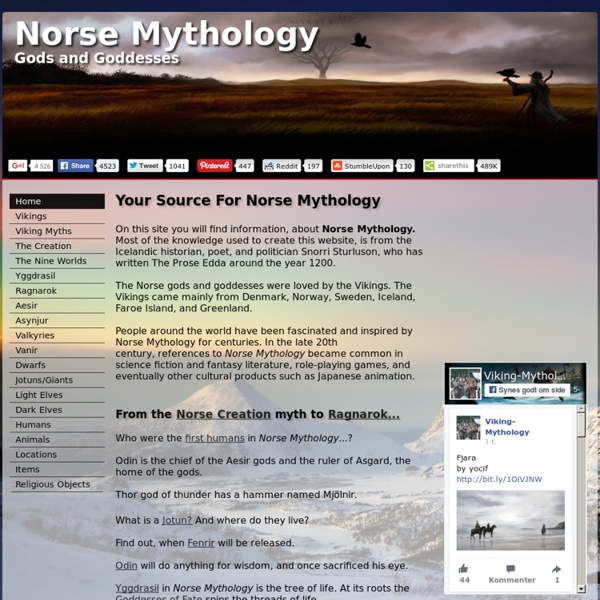



Odin's Discovery of the Runes The Norse god Odin is a relentless seeker after knowledge and wisdom, and is willing to sacrifice almost anything for this pursuit. The most outstanding feature of his appearance, his one eye, attests to this; he sacrificed his other eye for more wisdom. The tale of how he discovered the runes is another example of his unquenchable thirst for understanding the mysteries of life, not to mention his unstoppable will. The runes are the written letters that were used by the Norse and other Germanic peoples before the adoption of the Latin alphabet in the later Middle Ages. Unlike the Latin alphabet, which is an essentially utilitarian script, the runes are symbols of some of the most powerful forces in the cosmos. In fact, the word “rune” and its cognates across past and present Germanic languages mean both “letter” and “secret/mystery.” Odin’s Discovery of the Runes At the center of the Norse cosmos stands the great tree Yggdrasil. “Sacrificing Myself to Myself” References:
Norse Mythology - the gods of the Vikings Introduction The red-blooded, rip-roaring, gung-ho Gods beloved by the Vikings. We could have listed them as Nordic, but 'Norse' sounds like the snorting of a giant battle stallion so we went for that. Their idea of Heaven was VALHALLA. "Bjorn, when you took my head off with that double-headed axe — just fantastic! So welcome to the Norse pantheon, which is not just Norway but the rest of Scandinavia — which includes Denmark and Sweden. Something which helped enormously was that all these people spoke the same Norse language, and would have known their own Kingdoms under the names of Danmark, Vastergotland, Ostergotland and Svealand. Colonies and footholds were established all over the place, from Greenland to England - where their heritage includes Norfolk and Humberside with many Norse-named villages in between. Thanks to the richness of its legends, as told in the Eddas and a host of poetic sagas, Norse Mythology is as popular as ever. The Gods told us to do it.
Norse Mythology for Smart People - The Ultimate Online Resource for Norse Mythology and Religion Internet Sacred Text Archive Home Germanic Myths, Legends, and Sagas Compiled by D. L. Ashliman See also Folklore and Mythology Electronic Texts Germanic Geography The Germanic world. Germanic (Especially Old Norse) Mythology and Culture Ancient Monuments Dolmens in Denmark, a collection of photographs of pre-Christian stone graves and monuments.Runestones and Picture Stones from Scandinavia: A Selection of Photographs.The Sigurd Portal. The Gods' Home Pages Balder's Home Page.Frey's Home Page. The Vikings Vikings in America. Electronic texts Index of Folklore and Mythology Electronic Texts, compiled by D. Germanic Mythology and Culture Nordic Mythology, a summary essay from Sweden. Mythology and legendry in general Encyclopedia Mythica, edited by M. Fairy mythology The Yahoo index Society and Culture:Mythology and Folklore:Fabulous Creatures:Faeries. Folk and fairy tales Folk and fairy tale links, edited by D. Return to the top of this document Tabulation by WebCounter.
Norse Mythology: A Guide to Gods, Heroes, Rituals, and Beliefs - John Lindow Odin Odin (pronounced “OH-din”; Old Norse Óðinn, Old English and Old Saxon Woden, Old High German Wuotan, Wotan, or Wodan, Proto-Germanic *Woðanaz, “Master of Ecstasy”) is one of the most complex and enigmatic characters in Norse mythology, and perhaps in all of world literature. He’s the chief of the Aesir tribe of deities, yet he often ventures far from their kingdom, Asgard, on long, solitary wanderings throughout the cosmos on purely self-interested quests. He’s a relentless seeker after and giver of wisdom, but he has little regard for communal values such as justice, fairness, or respect for law and convention. He’s the divine patron of rulers, and also of outcasts. He’s a war-god, but also a poetry-god, and he has prominent transgender qualities that would bring unspeakable shame to any traditional Norse/Germanic warrior. He’s worshiped by those in search of prestige, honor, and nobility, yet he’s often cursed for being a fickle trickster. What’s in a Name? War Sovereignty Poetry
Germanic Mythology: Texts, Translations, Scholarship The Poetic Edda: Essays on Old Norse Mythology - Paul Acker, Carolyne Larrington Norse and German Mythology Myth is the foundation of life; it is the timeless pattern, the religious formula to which life shapes itself…Whereas in the life of mankind the mythical represents an early and primitive stage, in the life of an individual it represents a late and mature one. -- Thomas Mann The following list came from a dozen or so sources, including translations of the Eddas. Where applicable comparisons with Greek and Roman deities appear. Dedication: to my ancestors: my foremothers and forefathers who danced like furies, lived close to Earth, and held back the night in Britain, France, Germania, Holland, Scandinavia, Spain, Ireland, and Scotland. Aegir ("AY-ear"): the Norse sea god, master brewer of storms, and husband to Ran, with whom he had nine daughters who personify as waves. Axe-time, sword-time, shields are sundered, Wind-time, wolf-time, ere the world falls; Nor ever shall men each other spare.... Ran ("Robber"): net-wielding wife of Aegir and personification of the sea's danger.
History - Ancient History in depth: Viking Religion Germanic mythology Thor or Donar, god of thunder, one of the major figures in Germanic mythology. Germanic mythology is a comprehensive term for myths associated with historical Germanic paganism, including Norse mythology, Anglo-Saxon mythology, Continental Germanic mythology, and other versions of the mythologies of the Germanic peoples. Germanic mythology ultimately derives from Indo-European mythology, also known as Indo-Germanic mythology.